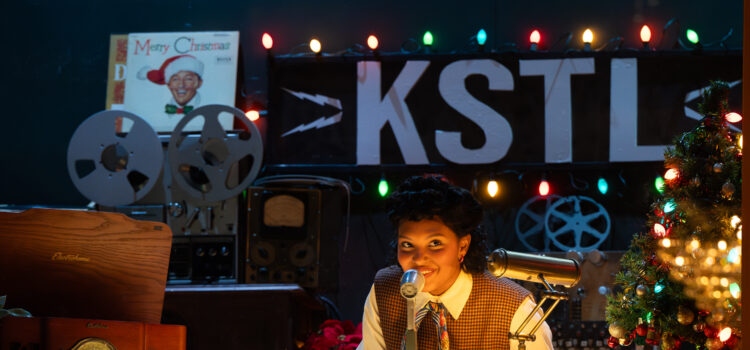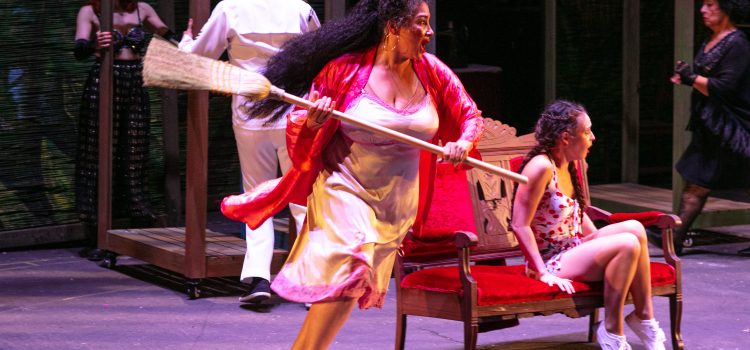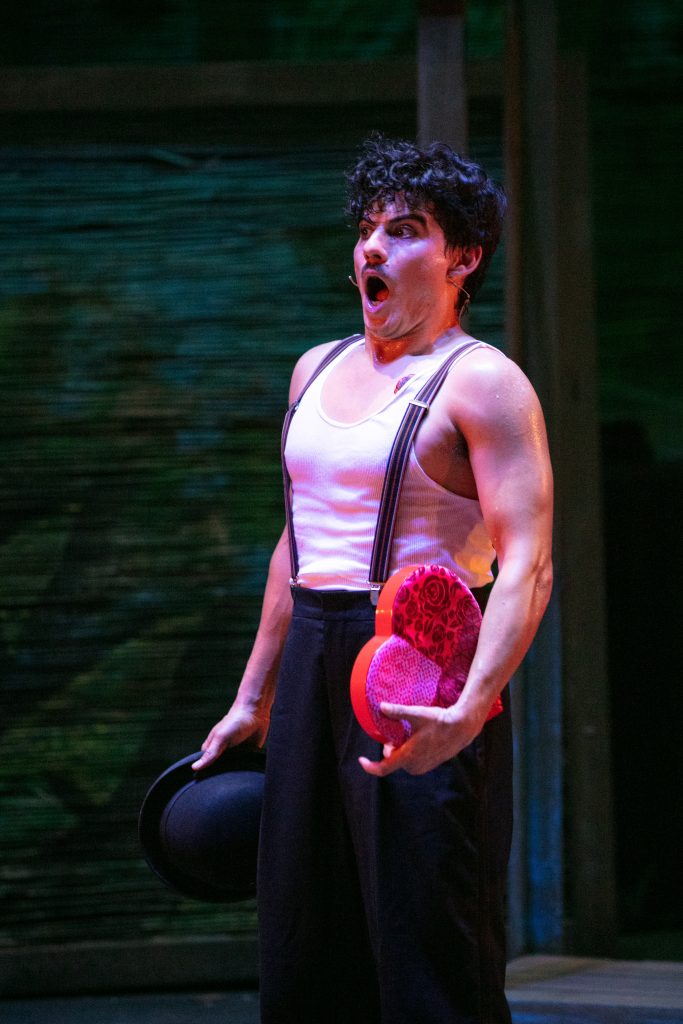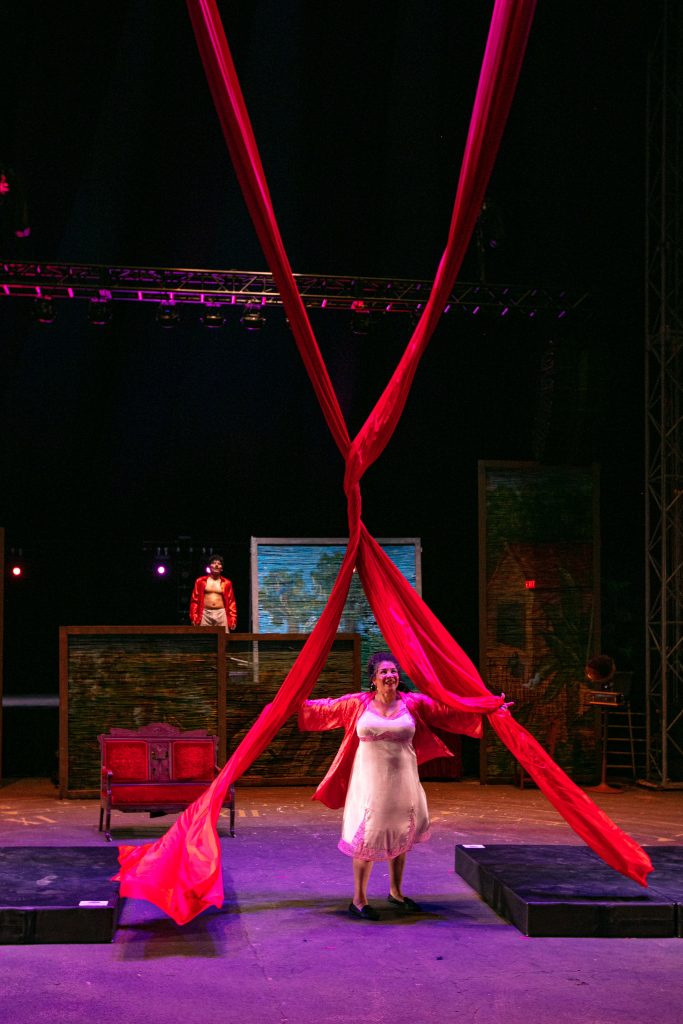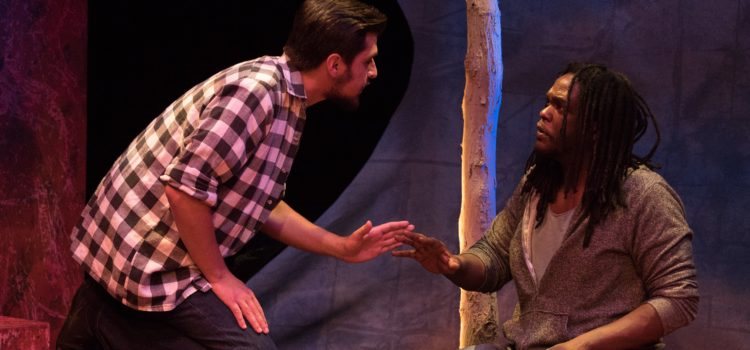By Lynn Venhaus
Overflowing with cheer and kindness, “It’s a Wonderful Life: A Live Radio Play” is as comforting as a mug of hot cocoa and as heartwarming as the cherished 1946 film.
Festively decorated inside and out for the holidays, The Repertory Theatre of St. Louis is the bearer of glad tidings with this crisp and polished production, an announced substitution for the previously scheduled “A Christmas Carol,” which had been presented in 2021 and 2022.
But this was more than a performance – it was a change in direction and a celebration of community. The Rep went public with their financial woes in mid-October, starting a “Rally for the Rep!” campaign to raise $2.5 million by year’s end to continue the 57-year-old regional professional theater in the new year.
A Dec. 17 benefit, an online auction, and other fundraising efforts are being promoted, and this production is the first opportunity for The Rep to welcome patrons back to the Loretto-Hilton Center since the news broke.
They have added some ‘zhuzh’ to the welcoming atmosphere. Company Manager Michael D. Ward donated for the decoration, design and setup of the interior and exterior, and collaborated with the front of house staff to set those charming scenes.
Besides the merry mood, opening night also was a statement. You could feel the goodwill from the audience, and in the lobby afterwards, where trays of chocolate chip cookies were placed, and people snapped photos near the John Goodman cardboard cut-out. Goodman, the world-renowned actor who is a hometown treasure, will headline the Dec. 17 benefit.
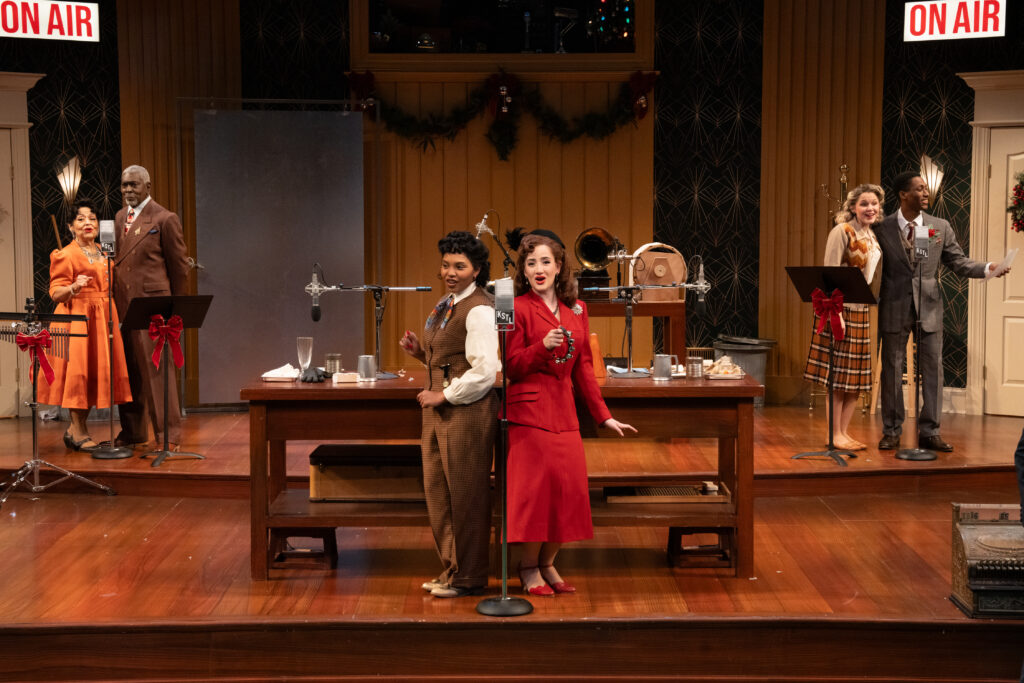
Everything about this show gleamed – the company of all local performers’ glee was palpable and the nostalgic setting of KSTL’s studio harkened back to the Golden Age of Radio.
This play-within-a-play is a savvy adaptation by Joe Landry, reworking his play that modified the movie that’s now a holiday staple. The twist to the timeless tale is that it’s being performed by characters who work at the radio station.
This version was first produced last year by the Alabama Shakespeare Festival, whose artistic director Rick Dildine was previously affiliated with the St. Louis Shakespeare Festival. And The Rep is producing this show in association with ASF and is made possible in part by the support of The Berges Family Foundation.
Kate Bergstrom has directed both, displaying a deft touch for staging the action for optimum viewing and maximum ‘feels.’ Stage Managers Emilee Buchheit and Anna Baranski energetically stage-managed the show to keep the 2-hour show running smooth.
The ensemble shines – in individual roles and as a collective in the workplace. Anchoring the show is Michael James Reed, playing actor Jake Laurents, who is also a military officer serving in World War II. He’s a terrific George Bailey, conveying the distress of a man whose faith and hope has been eroded, but also a caring neighbor and friend in his daily interactions.
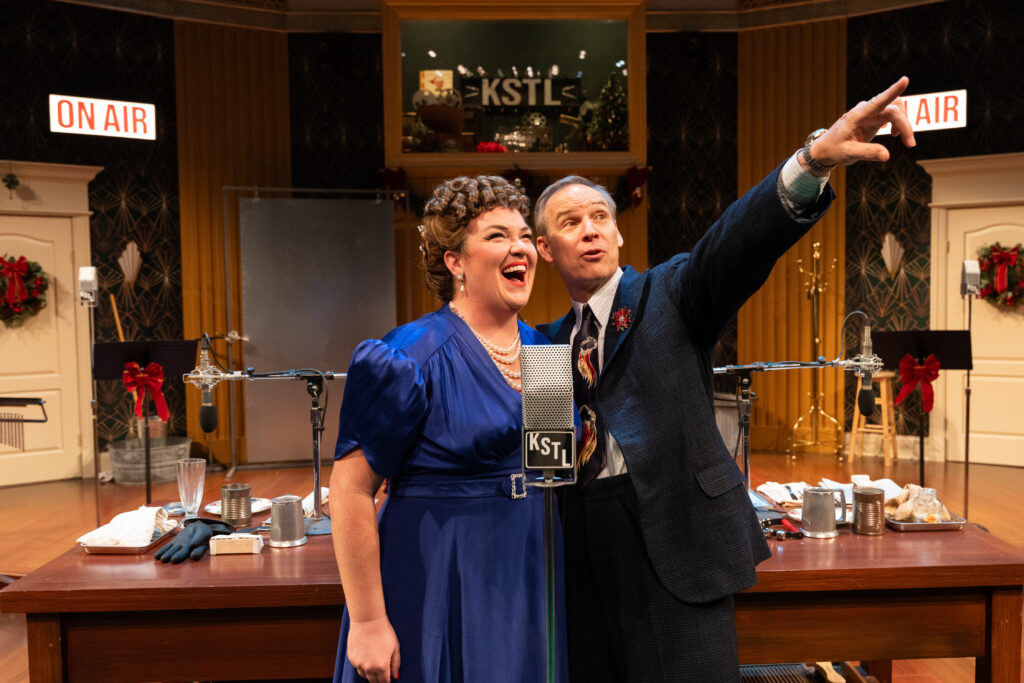
Laurents/Reed plays a family man and banker whose life in Bedford Falls is not what he had imagined for himself, but circumstances led to him to bloom where he was planted.
As problems mount up, and he wishes he had never been born, it’s up to his guardian angel, Clarence, to show him what the town would have been like without him — and the many good deeds he has accomplished.
Upon closer observation, the source material is quite dark — a man is desperate, ready to throw in the towel, feeling as if he’s failed. But looking back at the impact his life has made is a beautiful observation about connection. And we can all relate.
For the screenplay, movie director Frank Capra, three-time Oscar winner (“It Happened One Night,” “Mr. Deeds Goes to Town,” and “You Can’t Take It with You”) collaborated with married screenwriting duo Frances Goodrich and Albert Hackett, Oscar-nominated for “The Thin Man” and “Father of the Bride,” among their filmographies.
Their source was a 1943 short story, “The Greatest Gift,” written by Philip Van Doren Stern, which was inspired by Dickens’ “A Christmas Carol.”
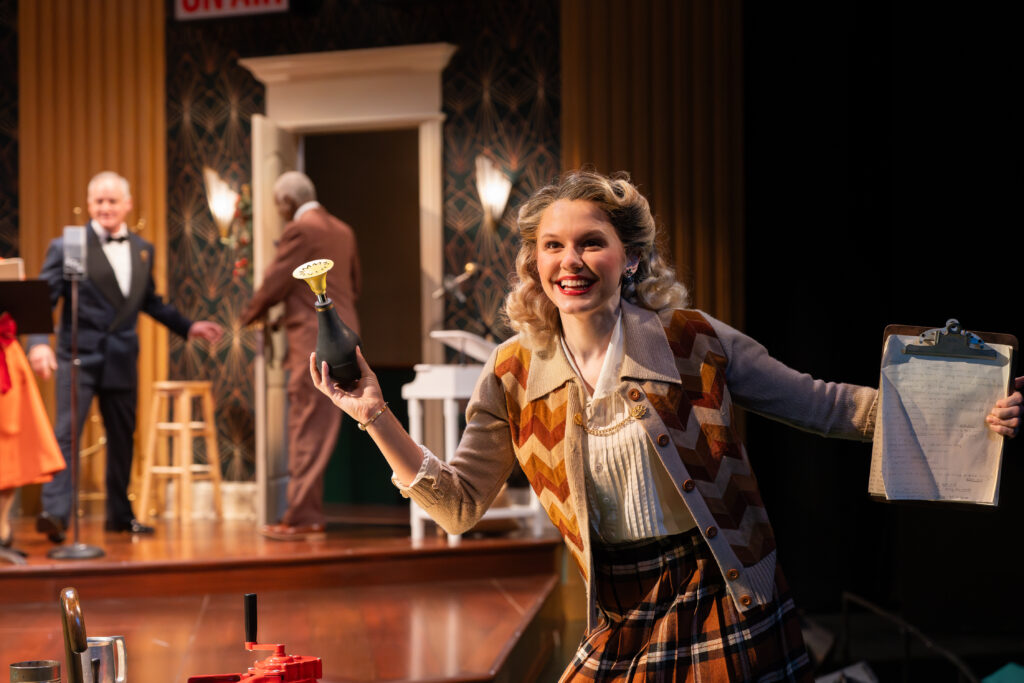
The movie, while earning five Oscar nominations in 1947, including Best Picture (lost to “The Best Years of Our Lives”) and another for Capra and James Stewart, was a box office flop and critics were lukewarm. It wasn’t until 1977, when its copyright lapsed and broadcasters were able to show it royalty-free, that it gained a following. Now it’s a perennial.
Today, no matter how many Christmas movies Hallmark churns out, “It’s a Wonderful Life” continues to top lists of favorite holiday movies. The Rep’s production reinforces why everyone loves it. Besides, who doesn’t want to believe in guardian angels?
The talent-rich 10-person ensemble is dialed in, seamlessly working together as radio employees and actors conveying the Bedford Falls denizens. Three are St. Louis Theater Circle winners (Michael James Reed, Eric Dean White and double-winner J Samuel Davis).
It’s fun to experience that part of America’s past, when a physical radio was an essential part of everyday life and the dominant home entertainment during the 1930s and 1940s. You’ve seen these settings in old-time movies and TV, and scenic designer An-Lin Dauber has recreated a vibrant studio where you can see — and hear — the sound engineers make the magic.
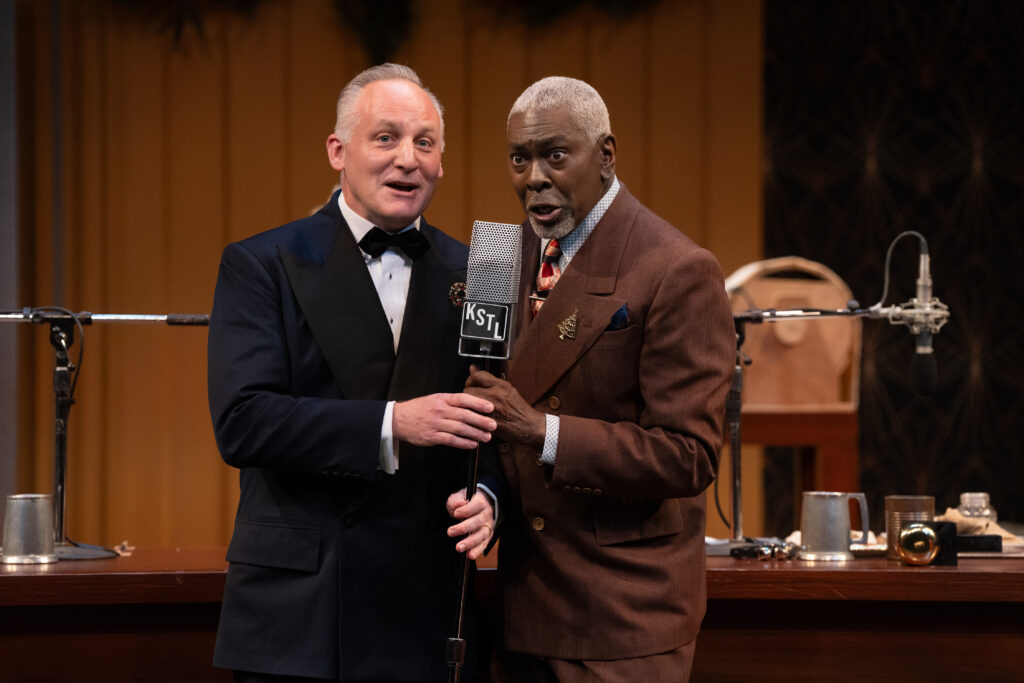
With his mellifluous voice, Eric Dean White strikes a pleasant tone as a seasoned radio announcer. He’s amusing when he delivers commercials for Schnucks, Crown Candy Kitchen, Ted Drewes, and others – delighting the audience.
DeAnte Bryant is a charmer as Harry Heywood, who is humorous, caring and concerned as the lovable Clarence, who has waited 200 years to get his wings. The brilliant local actor J. Samuel Davis is Dr. Richard Ross, doubling roles — compassionate as St. Joseph and conniving as greedy Mr. Potter, the corrupt power-hungry kingpin often stopped in his chicanery by George.
Melissa Harlow is actress Sally Applewhite who plays good-natured Mary, who eventually marries George and raises a family. Carmen Garcia is the sweet Rosa Ramos, who is playing both George’s kind mother and Mary’s busybody mom. Their fashionable frocks are part of Dauber’s vintage costume design, with Jordan Fell associate costume designer.
Smartly dressed in tailored attire as ‘career girls’ are Aria Maholchic who plays spirited actress Lana Sherwood, Jailyn Genese as the efficient Stage Manager and Daisy Held as the Sound Engineer.
The biggest crowd-pleaser was winsome TJ Staten Jr., stealing scenes as Lead Songbird and Sound Engineer. Making his debut at The Rep, the McCluer High School graduate, as Troy Staten, won the 2021 St. Louis Teen Talent Competition sponsored by the Fox Performing Arts Charitable Foundation.
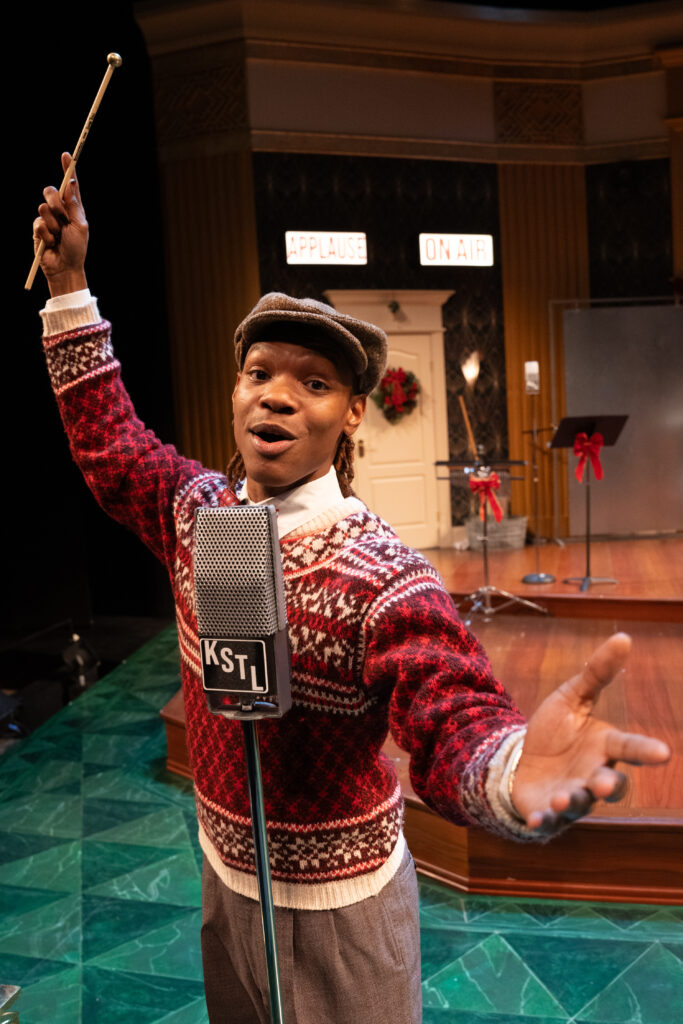
Lighting designer Christina Watanabe bathed the production in a poignant glow that enhanced the emotional depth, particularly when snowflakes fell. Moving from the cozy studio to the wintry town setting was an impressive transition.
The sound work was particularly noteworthy, because creating the sound effects to go across the airwaves isn’t as easy as it sounds. Special mention to Michael Costagliola as sound/foley designer and Andrew Ronver, the associate sound designer.
Another artisan helping establish the period was wig designer Dennis Milam Bensie.
It wouldn’t be a holiday radio show without singing, and music director Ron McGowan helped make the season bright, leading the ensemble in snappy seasonal favorites. When it was time for “Auld Lang Syne,” the audience joyfully chimed in with the ensemble. (Was anyone else misty-eyed?)
A sincere effort to inspire, touch, and engage, “It’s a Wonderful Life: A Live Radio Play” was a dandy celebration of what should be important this time of year.
Storytelling is vital to bringing us together, and this opportunity to remind us to believe in our purpose, be mindful of what’s around us, and never lose faith in humanity is evergreen.
It is a wonderful life – and I hope you leave this show with the promise of better days ahead, even if a happy holiday is elusive.
The Repertory Theatre of St. Louis presents “It’s a Wonderful Life: A Live Radio Play” Dec. 1-23 at the Loretto-Hilton Center, Webster University, 130 Edgar Road, Webster Groves. For tickets or more information, visit www.repstl.org or call the box office at 314-968-4925.
For more information about Phase One of the fundraising campaign, visit www.rallyfortherep.org
Rush Tickets: Available for students, seniors, educators, and theatre professionals by calling the Box Office at 314-968-4925, 1 – 2 hours prior to curtain time.
Audio-Described Performance: Thursday, December 21 at 7pm – the show will be described for patrons who are blind or have low vision.
ASL Performance: Saturday, December 23 at 2pm – the show will be signed for the deaf or hard of hearing.
Open-Captioned Performance: Sunday, December 17 at 2pm – an electronic text ticker displays words being spoke or sung onstage
(And if you are hankering to watch the movie, NBC will show it Christmas Eve, the E! Entertainment Channel will show it at 4 p.m. and 7 p.m. on Dec. 20. Bravo will show it at 6:30 p.m. and 9:30 p.m. on Dec. 15. It is also streaming on Amazon Prime with a subscription.)
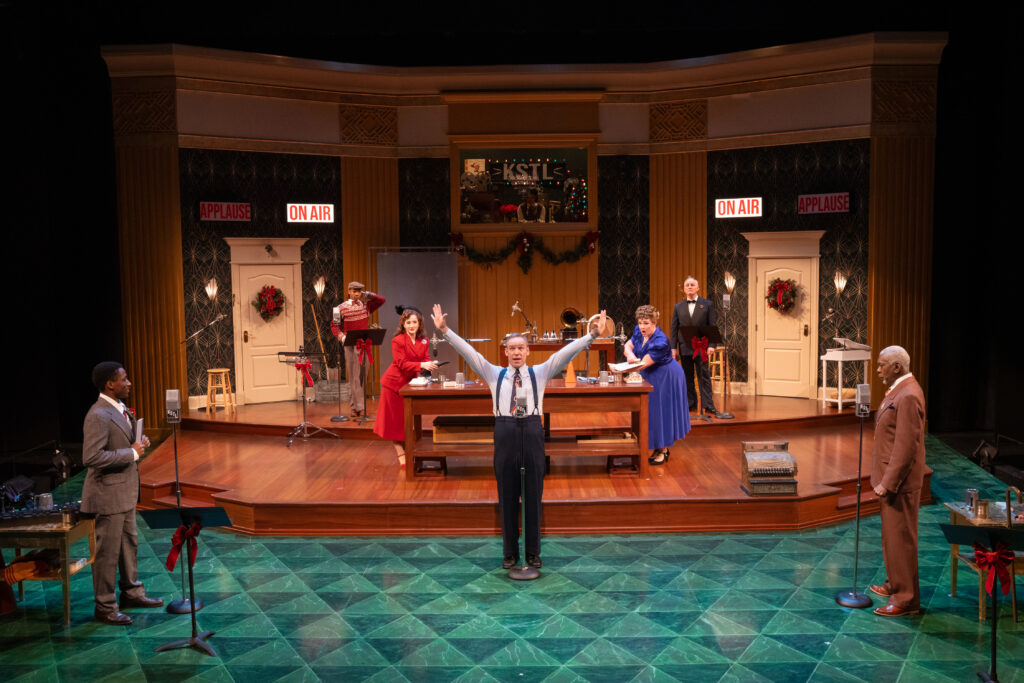

Lynn (Zipfel) Venhaus has had a continuous byline in St. Louis metro region publications since 1978. She writes features and news for Belleville News-Democrat and contributes to St. Louis magazine and other publications.
She is a Rotten Tomatoes-approved film critic, currently reviews films for Webster-Kirkwood Times and KTRS Radio, covers entertainment for PopLifeSTL.com and co-hosts podcast PopLifeSTL.com…Presents.
She is a member of Critics Choice Association, where she serves on the women’s and marketing committees; Alliance of Women Film Journalists; and on the board of the St. Louis Film Critics Association. She is a founding and board member of the St. Louis Theater Circle.
She is retired from teaching journalism/media as an adjunct college instructor.

